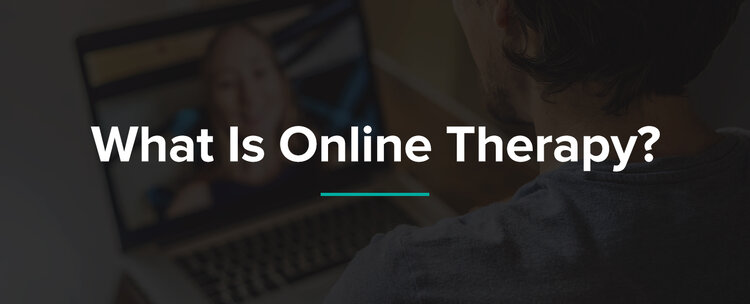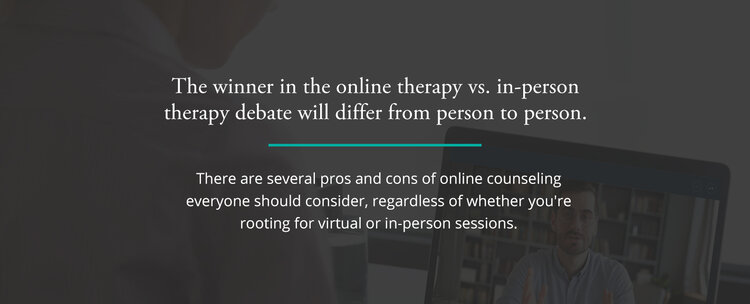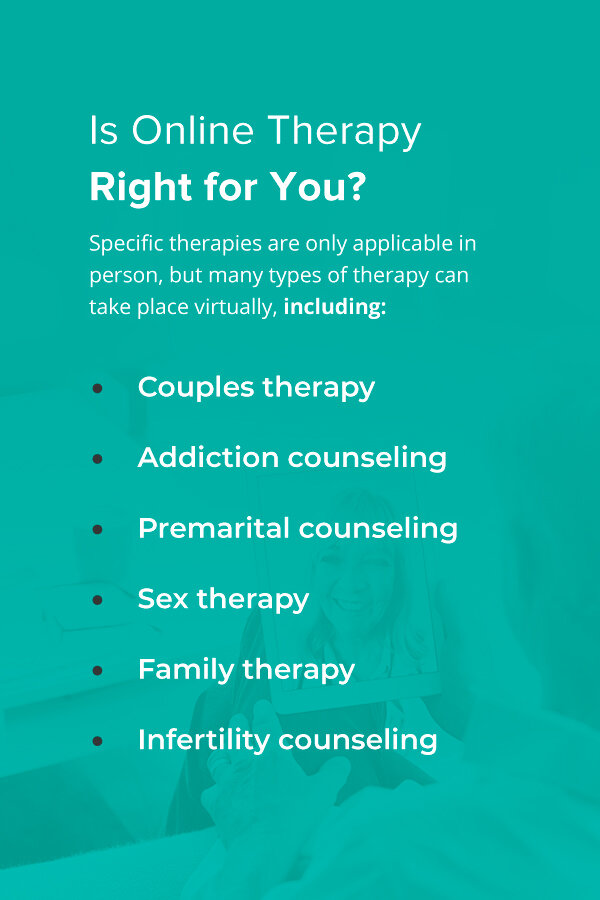
For many people, therapy is not an option. Whether it’s because of the stigma or they are physically unable to attend in-person sessions, people often can’t access needed mental health services.
With the advent of advanced technology, virtual counseling is becoming more prevalent. It’s allowing those who were previously unable to even consider therapy to access necessary mental health services with convenience. With a variety in the types of online therapy, and the lessening stigma around it, online therapy presents an alternative way to obtain professional therapy from licensed counselors in the comfort of your home.
Online Therapy Explained
Online therapy is a therapy that clients can access remotely, via telephone, email or video call. Obtaining mental health services via correspondence is the most succinct description of online therapy. However, in this day and age, it’s unlikely that the communication will be an exchange of letters in the mail. Instead, online therapy — as its name suggests — usually requires an internet or phone service. While many of the popular ways to access online therapy result in real-time sessions, there is also the option for time-delayed services, such as emails or even text messages.
Almost all types of therapy, from individual to couples to family therapy, can be available virtually. The kinds that aren’t available online require in-person interaction, such as play therapy.
How Does Online Counseling Work?
As mentioned, online therapy can use any form of communication that isn’t face to face, including the following.
-
Video conference
-
Phone calls
-
Emails
-
Real-time chats
-
Text messages
-
Smartphone apps
Usually, it’s necessary to have a computer, smartphone or tablet to access therapy sessions.
Once a client has found a therapist with the licensure to practice psychotherapy online, the client and therapist log into a secure site to do a video or audio conference. Clients can also have audio conferences using their home telephone or mobile phone, or communicate with their therapist via email or text messages. It’s possible to use one or more of these types of online therapy simultaneously. For example, a client could have a weekly video conference with their therapist, and be able to reach out to them via email between sessions.
Does Online Therapy Work?

It’s impossible to sum up the effectiveness of online counseling with a “yes” or “no.” The short answer is that the effectiveness depends on several factors, including which issues the therapist is treating. Research shows telepsychiatry can be effective with or without in-person therapy, but there are limitations to it. One study proved online therapy was effective in treating cases like anxiety and depression, and that cognitive behavioral therapy was as beneficial in a virtual setting as it was in person.
However, virtual therapy isn’t for everyone, and those who have more severe mental illnesses — such as those with a risk of psychosis — may not benefit from virtual therapy as much as they would from in-person therapy, or at least video conferencing. When the therapist can see their client, they can more readily pick up on any visual cues that may get lost via email or an audio call. Similarly, people who are in crisis or suicidal will likely find it more beneficial to speak to someone in person rather than virtually, and therapists may also discover they’re able to care for patients in crises better in person.
How is Virtual Therapy Different From In-Person?
When you walk into a therapy office, you have the familiarity of a waiting room, a handshake, a therapy room, a couch, etc. This allows clients to feel comfortable being open and vulnerable in their therapeutic space. In therapy online through video conferencing software, you can be in the comfort and safety of your own home, surrounded by your furniture, photos, and sounds. Virtual therapy also allows you to see your therapist from places other than your home such as the office, your car (if parked), or on a business trip. This service even allows for couples to get relationship therapy when they are not in the same location.
Does Insurance Cover Online Therapy?
Some insurers do cover virtual therapy, but many still don’t, which means clients must pay out of pocket if they choose this option. Those insurance companies that do cover it may have stipulations stating which therapists or companies they’ll cover.
However, with more and more people seeking online therapy, insurance providers are increasingly beginning to see that it’s as valid as in-person therapy, and covering virtual sessions as well as in-person ones. The Centers for Medicaid and Medicare Services recently extended coverage to virtual therapy, allowing physiotherapists, nurses and other medical professionals to offer telehealth services to clients.
Is Online Therapy Safe?
As long as a professional, licensed therapist conducts the virtual session, you should be able to trust that everything you say is confidential and secure. However, technological advancements dictate increased security is often necessary, especially when dealing with sensitive information, such as your health records. For this reason, it’s vital to ensure the therapist is conducting sessions on a safe, encrypted network to keep all information between the client and their counselor private. Unencrypted networks leave both parties open to hackers or viruses.
Diligence on both the therapist’s and client’s part is essential, and both need to be aware of the limitations of their equipment and programs. Steps to take include making sure everything is secure and ensuring both parties are using up-to-date devices that won’t malfunction in the middle of a session. Clients and counselors alike also need to be careful about the potential theft of their technology, especially if conducting the session outside their homes. For similar reasons, it’s smart to avoid using public Wi-Fi networks for confidential sessions.
Ensuring all your security programs and hardware are up to par and working properly, and never giving out personal information unless you’re positive your connection is secure, are good practices for clients and therapists. It’s essential for clients to remember that you need not share any information you’re not comfortable providing in a virtual session unless you’re 100% confident that both your and your therapist’s connections are completely secure.
On top of that, therapists who conduct virtual sessions are also under the obligation to adhere to specific guidelines outlined by the American Psychological Association, designed to keep themselves and their patients safe. These guidelines touch on topics of informed consent from the client, keeping data and sessions confidential and standards of care, among others.
What Are Some Pros and Cons of Online Therapy?

Different people will have various opinions about virtual counseling based on their experiences and preferences. For example, some people may prefer in-person therapy and feel it’s more beneficial than virtual counseling, while others may begin attending more counseling sessions online due to the convenience. The winner in the online therapy vs. in-person therapy debate will differ from person to person. There are several pros and cons of online counseling everyone should consider, regardless of whether you’re rooting for virtual or in-person sessions.
Pros
Convenience is the most evident benefit of online therapy, since it allows both the therapist and client to be in the comfort of their home for the session. Additionally, it’s also beneficial for those who find it challenging to take time out of the workday to attend appointments. Virtual therapy allows them to save some time commuting and have counseling on their schedule. This convenience extends to those who live in remote areas or places where it’s difficult to access mental health services. Similarly, those who live with physical disabilities that make it hard or even impossible to attend in-person sessions at a therapist’s office can take advantage of virtual therapy by logging on and getting the help they deserve.
Another plus is the comfort virtual therapy affords some people. Any type of therapy can be a nerve-wracking event, and many people may find it even more stressful to visit a therapist’s office and wait for their appointment to start. With virtual therapy, these clients can settle in a place where they feel comfortable — like their couch — surrounded by familiar objects and furniture. The increased comfort level may even help clients open up more easily than they would in a therapist’s office.
While the social stigma around mental illness and mental health services is decreasing, it isn’t obsolete yet. There are still people who opt not to get therapy because of the stigma around it. Accessing virtual therapy in the safety and privacy of their home solves the problem of someone spotting them going to counseling. Telehealth allows clients to get the relief they need while also helping them acclimate to the idea of mental health services and shed the stigma about it in themselves.
Cons
The primary disadvantage of virtual therapy is concerns about its safety and security. Technology makes life much simpler and more convenient, but it’s also fallible, so worries about unauthorized third-party access to confidential information are legitimate. In the same vein, people who aren’t as technologically savvy might have an uphill battle getting the hang of virtual therapy, and might be at higher risk of having their privacy breached because they may not be aware of which security measures to take to keep themselves safe.
Another potential con is the therapist’s inability to pick up on visual cues. This shortcoming is especially relevant in online therapy without video, but even in a video conference, unless the client is sitting so the therapist can see their entire body, it’s inevitable that the therapist will miss specific physical signs that could indicate a problem. These cues are easy to spot during in-person sessions, and help the therapist understand how the patient unconsciously reacts to some topics or feelings. They can be useful tools for a therapist, and their absence could lead to less effective therapy.
Similarly, in non-verbal therapy, such as email, it’s possible to miss nuance altogether, making it difficult for the therapist to know when or if the client may be a danger to themselves or others. If the therapist can identify a client in crisis, online therapy may make it challenging for them to help the client on time. This concern is especially relevant if the therapist is treating a client in a different city or state. For similar reasons, clients with severe mental health issues or who have regular suicidal ideation may not be good candidates for virtual counseling, since their problems are more complicated and require therapy that’s more interactive than what the virtual setting allows.
What Is the Future of Virtual Counseling?
A study from 2018 revealed that very few psychotherapists used virtual therapy in their practice, and those who did limited it to phone or email. However, as the country begins relying more heavily on the internet for work and leisure alike, the future of mental health services suggests continued use of online therapy, both for those who require it and those who prefer it.
The major hurdles that still prevent some people from accessing virtual therapy — such as security concerns — are top of mind for researchers, who are working to establish ways to overcome these issues to make virtual therapy a viable, long-term solution for everyone.
However, it’s crucial to note that it’s unlikely traditional, in-person therapy will become obsolete. Instead, there’s a good chance that counselors will offer online therapy in tandem with in-person therapy, allowing clients to opt for either or both as they see fit.
Is Online Therapy Right for You?

You must answer this question for yourself, since it relies on several factors, mainly whether you want to try online therapy or not. If you’re unable to leave the house for whatever reason, but want to seek qualified help, online therapy may be an excellent option for you. If you’re struggling to squeeze therapy sessions into your hectic schedule, you can see if any therapists are willing to provide virtual counseling outside business hours.
The type of therapy you’re seeking will also factor into whether virtual counseling is right for you. As we mentioned, specific therapies are only applicable in person, but many types of therapy can take place virtually, including:
The benefit of virtual therapy for families or couples is that clients don’t all need to be in the same location to participate. As long as each person is available at the appointment time, couples therapy or family therapy can have clients conversing across various cities, states and maybe even countries.
How to Get Started With Virtual Therapy
The internet is the best place to seek therapists who provide virtual therapy sessions. However, you should make sure the therapists you’re considering have received all necessary certifications and licensure to practice psychotherapy in your state. Ask about their experience with virtual therapy sessions and which programs or apps they use. You may also want to research the safety and security of these apps before choosing a therapist.
Alternately, if you already have a therapist you see in person, you can ask if they provide virtual counseling and if it’s possible to move your sessions online. Doing so may be an adjustment for both of you, especially if you’ve been seeing each other for a long time. However, it may be a smoother transition to virtual therapy, since you’ll already have an established relationship with the therapist.
Get Individual and Couples Therapy at Stanford Couples Counseling
Whether you’re seeking a brand-new psychotherapist or looking to switch over to virtual therapy, Stanford Couples Counseling is here to provide you with the virtual mental health services you need. With a range of couple, family and one-on-one options, and same-day appointments available, our priority is to get you the help you need — without making you wait.
If you’re ready to step into virtual counseling, we invite you to make an appointment with one of our many counselors today.



